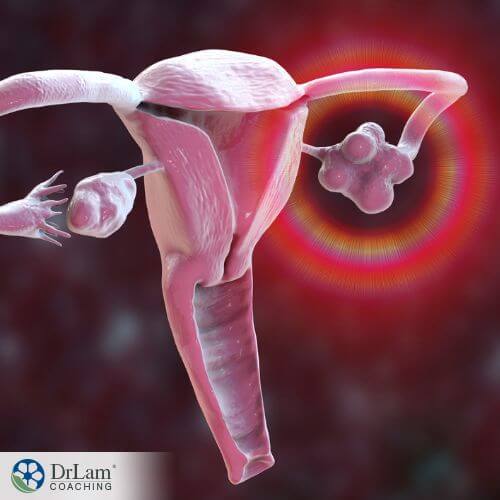 Polycystic ovary syndrome (PCOS) is a condition that affects many women, and it is to blame for some uncomfortable, painful, and potentially embarrassing symptoms. It can also be very difficult to manage, as there is no way to eliminate it completely. However, that doesn’t mean that there's nothing you can do. The PCOS diet is one way to help manage your symptoms and get back to enjoying your life once more.
Polycystic ovary syndrome (PCOS) is a condition that affects many women, and it is to blame for some uncomfortable, painful, and potentially embarrassing symptoms. It can also be very difficult to manage, as there is no way to eliminate it completely. However, that doesn’t mean that there's nothing you can do. The PCOS diet is one way to help manage your symptoms and get back to enjoying your life once more.
Women with PCOS, or polycystic ovary syndrome, have multiple cysts in their ovaries, usually caused by the overproduction of androgens. Androgens are hormones like testosterone. We often think of these hormones in connection with men, but they are also essential for the health of female bodies.
But when you have too much of these hormones, it can cause health problems like PCOS. Some of the common symptoms that come with this condition are:
Unfortunately, PCOS symptoms often go unidentified. Many women don't see a doctor about their symptoms until they have trouble getting pregnant. And for this condition, addressing it as soon as possible is key to a good outcome and feeling better over the long term.
Aside from the above symptoms, PCOS is also associated with an increased risk of more serious, long term health problems like:
That’s why it’s so important to manage your symptoms with strategies like the PCOS diet, before they get worse. Even imbalances that are only uncomfortable can have long-term consequences.
PCOS is heavily influenced by your diet. This is mostly due to the effects of insulin. Insulin is a hormone that helps turn sugar into energy, and it’s produced by the pancreas. If your body doesn’t produce enough insulin, or if you have insulin resistance, which means your body’s reaction to insulin is impaired, it can cause high blood sugar levels.
Your body doesn’t like it when your blood sugar levels rise, so in these situations, it usually pumps out more insulin. This is a problem because high insulin levels cause the ovaries to produce more androgens, which can bring on PCOS. This may explain why many women with PCOS also have high insulin levels.
Insulin resistance can be caused by diabetes, but it’s also linked to excess weight and a diet that’s too high in refined carbohydrates. This is why the PCOS diet can be so effective in managing the underlying issues that bring on PCOS.
Choosing the right diet can be one of the best ways to improve your PCOS symptoms. If you want some help with this, it's a good idea to see a medical professional first. A doctor is best positioned to help you make changes without aggravating any other health issues.
These three diets are particularly helpful for reducing PCOS symptoms.
 Many of the symptoms associated with PCOS, including fatigue, are related to inflammation. So, eating more anti-inflammatory foods like fatty fish, leafy greens, and olive oil can be helpful.
Many of the symptoms associated with PCOS, including fatigue, are related to inflammation. So, eating more anti-inflammatory foods like fatty fish, leafy greens, and olive oil can be helpful.
It’s important that you control your insulin levels when you have PCOS, as this will help to lower your androgen levels. The GI diet is filled with foods that digest slowly, which means lower insulin levels and slower level rises after eating. On this diet, you’ll be eating a lot of nuts, seeds, legumes, whole grains, and starchy vegetables.
The Dietary Approaches to Stop Hypertension (DASH) diet is designed to help reduce the risk of developing heart disease. It’s also low in saturated fat and sugar, which will reduce inflammation, help stabilize your insulin levels, and improve your overall health. On this diet you’ll eat plenty of fish, fruits, vegetables, whole grains, poultry, and low-fat dairy products.
Customizing your diet can give you more options and flexibility than going with a restrictive eating plan. To design your own PCOS diet, generally speaking, you'll need to eat more anti-inflammatory foods and foods that contain lots of fiber, like fruits and vegetables. The extra fiber will help slow down your digestion and decrease the impact of sugar on the blood. You will also need to focus on protein and healthy fats that make you feel full, so you don’t end up reaching for sugary snacks.
Here are some foods that you should eat more of on this diet:
There are also foods that you will need to avoid or limit on the PCOS diet. These foods can worsen insulin resistance and cause inflammation, which will make symptoms worse. The key foods to avoid are:
You will need to read your food labels when you’re on this diet. Avoid any foods that contain sugar in the first few ingredients. And remember that sugar comes in many different forms, so when you’re reading labels, look out for:
 In addition to the PCOS diet, there are also several lifestyle factors that help improve symptoms and reduce your risk factors. These factors include:
In addition to the PCOS diet, there are also several lifestyle factors that help improve symptoms and reduce your risk factors. These factors include:
PCOS, hormone imbalance, and insulin imbalances can also be closely related to stress. When you’re stressed, it activates the body's NeuroEndoMetabolic (NEM) stress response. This prompts the adrenal glands to release cortisol, which helps you survive the cause of the stress. Normally, when the stress passes, your cortisol levels go back to normal, allowing normal functions to return.
But the tiny, accumulative stressors in the modern world have disrupted this natural balance. In too many people, the NEM stress response is active all the time. Under these conditions, the adrenal glands can start to fatigue, failing to produce enough cortisol and leading to a slew of other hormone imbalances as well.
This state is known as Adrenal Fatigue Syndrome (AFS), and it can cause a whole range of symptoms, from ongoing fatigue to fertility issues and PCOS. Overcoming AFS can be difficult and complicated, but the PCOS diet is actually helpful for many of the symptoms related to AFS.
In AFS, the Hormonal Circuit is the part of the NEM most likely to become unbalanced, causing a whole range of problems and symptoms. The Hormonal Circuit consists of the thyroid, the adrenal glands, and the reproductive system, which is the ovaries in women. Working together, these three components are responsible for numerous hormones. In fact, the adrenal glands alone release more than 50 hormones into the body, including cortisol.
Hormones exist in a delicate balance, and many of them share the same building blocks. This is why, when one hormone becomes imbalanced, it affects the functioning of many other hormones. Cortisol uses the same precursor hormones as reproductive hormones, like estrogen, progesterone, and testosterone. Thus, making too much cortisol can deplete the resources needed to make enough of these other hormones, or to balance out the hormones you already have. This can result in symptoms such as hair loss, fatigue, PMS, a low libido, exercise intolerance, irregular periods, and infertility.
Hormonal Circuit dysfunctions can result in unstable estrogen and progesterone levels, two of the most important hormones in the female body. These hormones are responsible for the ovulation cycle, along with other duties, and are controlled by the hypothalamic-pituitary-gonadal (HPG) axis. The hypothalamus is a part of the brain that works to regulate the hormones that are released by the ovaries. It does this by way of more hormones.
When ovulation isn’t successful because of PCOS, progesterone levels drop. The hypothalamus then tries to stimulate the release of more estrogen and androgens from the ovaries, which can result in high levels of estrogen and androgens, worsening or bringing on AFS and Hormonal Circuit dysfunctions.
The PCOS diet may help to stabilize some of these hormones, which will ease the strain on the ovaries and encourage them to function properly. This in turn will positively impact the thyroid and the adrenal glands, improving the health and balance of the Hormonal Circuit overall.
The PCOS diet may help improve hormone imbalances and AFS at the same time that it helps to alleviate PCOS symptoms. Here’s how:
One major factor that aggravates AFS and PCOS is a diet filled with processed, sugary, or fatty foods. By supplying your body with healthy, nutritious foods, the PCOS diet may help to remove this stressor, which will improve AFS overall and support healthier hormone balance. Making sure your body has enough key nutrients to make critical hormones is also helpful.
Unstable blood sugar levels are a common symptom of AFS and PCOS. They also make you hungrier, encouraging over-eating. Insulin, essential for managing blood sugar levels, is also a hormone and is affected by hormone malfunctions. Stabilizing these blood sugar levels through a healthy diet helps to stabilize insulin hormones, reduce over-eating, and rebalance hormones.
You should never suffer in silence when it comes to symptoms of PCOS. If you don’t get the professional help that you need, you will miss out on potentially helpful strategies to protect your health over the long term. Adopting a PCOS diet is one such strategy.
Here’s how to start alleviating the problems associated with this condition:
For more help developing an eating plan that works to balance your hormones like the PCOS diet, talk to our team at +1 (626) 571-1234 or click here.
The PCOS diet can help eliminate or reduce the symptoms of polycystic ovary syndrome, a troubling condition that can cause long-term health problems like diabetes and heart disease. It does this by helping to lower insulin resistance and restore your hormone balance, through foods that focus on healthy proteins, fats, and fiber.
